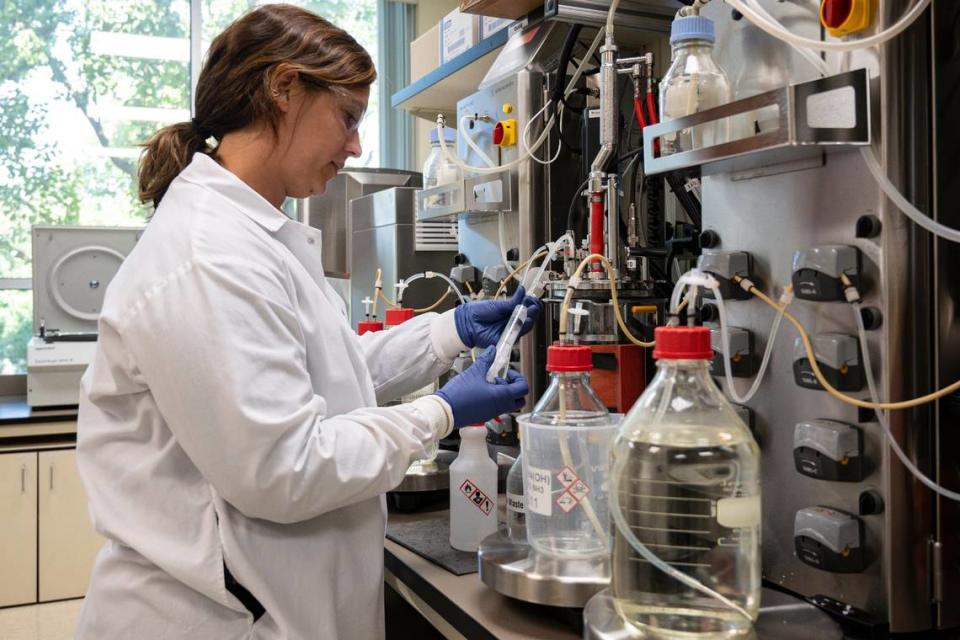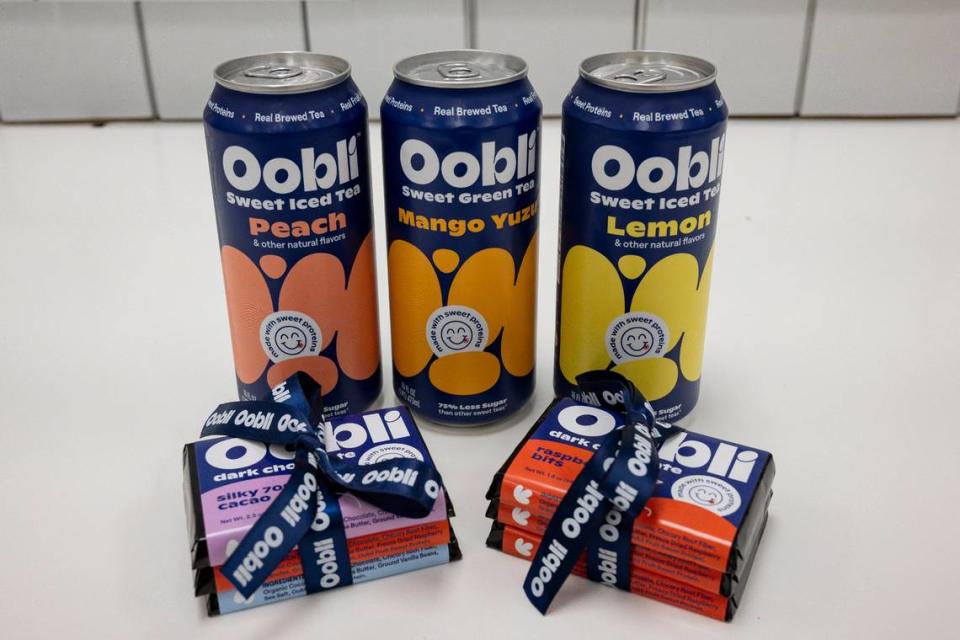Davis startup releases unique sweet tea. Here’s what makes it different
- Oops!Something went wrong.Please try again later.
Can sweet tea taste as refreshing without most of its sugar? A Davis startup says yes; now customers in the college town can find out for themselves.
A company called Oobli recently rolled out cans of iced tea that get most of their sweetness from plant-based proteins.
It took seven years of experimentation for Oobli’s cans of peach, lemon and mango yuzu tea to hit shelves around Davis and Los Angeles seven weeks ago. Still, it’s a milestone for sweet tea fans who don’t want all that sugar, co-founder and Chief Technology Officer Jason Ryder said.
“While there are other companies experimenting with sweet proteins, we are the first in the world with products on the market,” said Ryder, a UC Berkeley adjunct professor and executive director of the university’s master of bioprocess engineering program.
Oobli sweetens its teas with a protein called brazzein, which comes from the West African fruit oubli. The fruit is known for its large red berries, sometimes mottled with gray.

How the teas are created
Oobli works with the gene of a protein in the oubli fruitthat is 500 to 2,000 times sweeter than sugar. Company lab technicians use a fermentation process using the gene and a food safe yeast to reduplicate the protein. The process takes place in large tanks, similar to what Ryder said could be found in a brewery.
Ryder said the exact process is proprietary, the company’s secret sauce in its efforts to offer a healthy alternative to traditional sugar filled drinks or those with controversial sugar substitutes.
The resulting product tastes similar to traditional iced teas, which can have up to 50 grams of sugar. Oobli’s teas, on the other hand, have 7 grams of sugar from fruit juice and/or purées (plus a dash of agave syrup) per 16-ounce can, each of which retails for $3.

After all, no one is going to buy Oobli’s teas if they doesn’t taste good, Ryder said. Oobli’s target market is consumers who want a tasty, healthy alternative to traditional sugars or the sugar substitutes found in diet sodas.
The company also is manufacturing several dark chocolate bars using sweet proteins. A milk chocolate product also is being developed and could come out by the end of the year.
But Ryder sees the sweet tea market as Oobli’s biggest opportunity because cold beverages are where most American’s consume their largest percentage of sugars and sugar substitutes.
“We want to build our brand around drinks because that is where we feel we can have the biggest impact,” he said.
The company, however, is also exploring using the sweet proteins in other foods, though Ryder said he can’t go into detail just yet.
“We’re going to be in Davis for a very long time and have a lot more products,” he said.
The company’s testing lab at its 20,000-square foot Davis office location contains fermentation tanks where research on the sweet protein fermentation process is done, but actual manufacturing is done at a contract company in Los Angeles.
While Ryder lives in Berkeley, he founded Oobli in Davis because of UC Davis’ large graduating talent pool and specialized food and agricultural programs. Several other Yolo County startups have chosen the region for similar reasons.
Where’s the tea?
Eventually, CEO Ali Wing hopes that Oobli tea will be available for purchase throughout the U.S., including in Sacramento.
But Oobli is being marketed first in Los Angeles because it has the largest population in California “and is the center of trends.” The company regularly samples its teas at fairs, farmers markets and other community events around the city, Ryder said.
Oobli founders hope the buzz from Los Angeles consumers will attract media and social network attention. The tea is also available in select Davis stores and restaurants (including WestLake Market, Village Pizza & Pints and Super Owl Brewing), and by mail order through Oobli’s website.
The company’s dark chocolates are only available by mail order and a few select specialty merchants in New York City.
The company is reliant for now to on small businesses to sell its products because it is still awaiting on what is called a “no questions letter” from the U.S. Food and Drug Administration that its sweet proteins are safe to consume. Ryder said he expects that letter from the FDA by the end of the year.
.
Major retailers like Walmart or Safeway are cautious and won’t sell a product until the FDA issues that letter, he said.
In the meantime, he said, consumers should be confident that the sweet proteins are safe.
“Getting a no-questions letter goes above and beyond our strict compliance to all federal food-safety regulations,” he said.
Oobli has 42 employees in its Davis headquarters and has attracted startup capital of $40 million. The most recent round of funding, $25 million, came a year-and-a-half ago.
Why this?
Ryder said Oobli was founded on the idea that sugar and artificial ingredients used to sweeten foods can be unhealthy.
“They are contributing to a health crisis that you can see in rates of diabetes, heart disease and obesity across the planet, including in the U.S.,” he said.
Sugar substitutes, too, have their share of detractors. A recent International Agency for Research on Cancer study found that large daily doses of aspartame, a common artificial sugar substitute, can cause liver cancer, though it’s safe at lower levels.
“I don’t want to stop anyone who’s passionate about drinking diet soda from doing so, I just want to provide alternatives,” Ryder said.
Brazzein leaves sweet taste on the tongue similar to sugar, Ryder said, but digests easier and won’t trigger blood sugar increases. That being said, he understands why people crave sugar and its substitutes.
“The challenge is that we are hard-wired for sweetness as human beings,” Ryder said.

